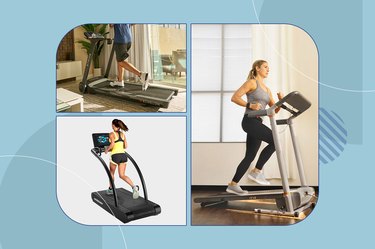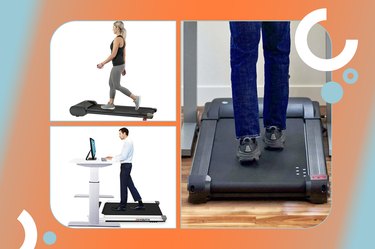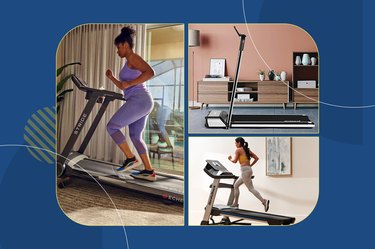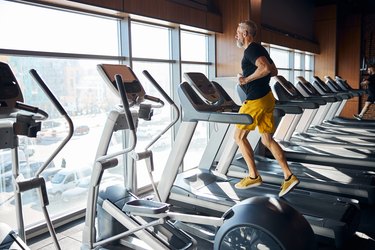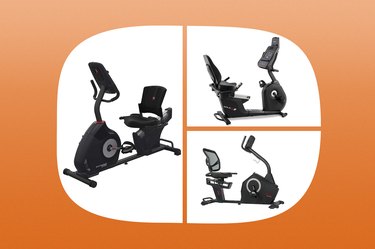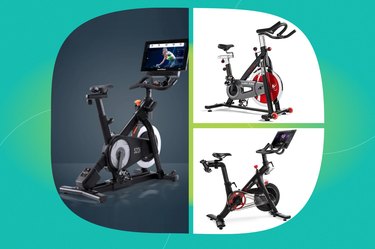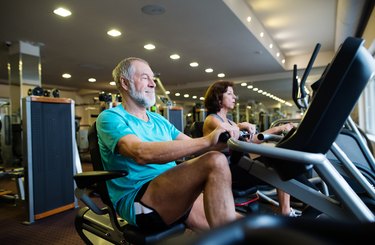
You want to make your workout efforts pay off. With the array of cardio equipment offered in gyms, it can be difficult to figure out which machine will offer the best workout for your needs.
Two effective pieces of equipment, the treadmill and the recumbent bike, can help you burn calories and build cardiovascular fitness. Figuring out which is better really depends on your personal preferences and exercise goals.
Video of the Day
Video of the Day
Treadmill Benefits
The treadmill is one of most beginner-friendly pieces of exercise equipment with lots of perks.
It's Versatile
Treadmills allow you to take your walk or run indoors when your schedule or the weather aren't ideal for outdoor workouts. You can experiment with a mix of speeds and inclines for variety in your workouts — you can walk casually, hike hills, perform intervals, train for a race, run sprints or take a light jog.
It's Beginner-Friendly
People of most fitness levels can use a treadmill, and the movement comes naturally. The machines are also relatively easy to figure out without much instruction.
It Involves Some Impact
Treadmill workouts are generally lower-impact than running or walking on a sidewalk. But the treadmill still involves some impact, which is beneficial for building and preserving bone density, according to the Cleveland Clinic.
It Burns Calories
Depending on how fast you go and the incline you tackle, you can burn a significant number of calories (if that's your goal) on the treadmill. Here's how 30 minutes at a few different speeds stack up for exercisers of two different body weights, according to Harvard Health Publishing.
Speed in mph | 155-pound person | 185-pound person |
|---|---|---|
3.5 | 133 calories | 159 calories |
5 | 288 calories | 336 calories |
7.5 | 450 calories | 525 calories |
Treadmill Downsides
That said, the treadmill may not work for everyone.
It Might Be Too High-Impact
If you're recovering from a lower-body injury or live with osteoarthritis, your doctor might recommend avoiding the impact involved with treadmill walking or jogging in favor of something lower-impact like a recumbent bike or elliptical, according to Consumer Reports.
It Can Be Noisy
Pricier models might result in quieter walks and runs, but other machines (like ellipticals and recumbent bikes) are generally less noisy overall, according to Consumer Reports, so if you're considering buying a cardio machine for a home gym, it's worth testing out a few options.
It Can Really Hurt if You Fall
Most of us have seen at least one epic treadmill fail video or GIF circulating online — and most of us do not want to experience that firsthand. Recumbent bikes are a bit more stable and safer for the fall-prone among us.
Recumbent Bike Benefits
Recumbent bikes look like regular stationary bicycles, but with a bucket seat and pedals in front of the body, rather than below the hips. Here are some of the perks to consider when riding this style of exercise bike.
It's Beginner-Friendly
Anyone who has ridden any kind of bike before should find the movement comes relatively naturally on a recumbent bike at the gym. They're also pretty easy to use without much instruction — just sit down and start pedaling.
It's Gentle on Wrists and Shoulders
The handlebars on a recumbent stationary bike are generally out in front of your shoulders, allowing you to hold on without putting stress on your wrists or shoulders like you might on an upright bike.
It's No-Impact and Stable
A recumbent bike helps if you can't have any impact in your workouts. It's great for people recovering from injuries or who have balance limitations. For these and other reasons, it's considered a more accessible piece of equipment, according to the National Multiple Sclerosis Society.
It Builds Strength
Recumbent bikes elicit similar muscle activity in your core and hips compared to upright bikes, according to an April 2016 article in the International Journal of Sports Physical Therapy.
It Burns Calories
While it's typically considered a gentler workout, you still burn calories on a recumbent bike — especially if you pedal faster or change the resistance (usually one of the main settings on the display of a stationary recumbent bike).
Take a look at how 30 minutes at two different intensities compares for exercisers of two different body weights, according to Harvard Health Publishing.
Intensity | 155-pound person | 185-pound person |
|---|---|---|
Moderate | 252 calories | 294 calories |
Vigorous | 278 calories | 441 calories |
Recumbent Bike Downsides
There aren't a lot of disadvantages of riding a recumbent bike at the gym. The cons are more relevant if you're buying your own.
It's Pricey
You can certainly find more budget-friendly options, but some makes and models of home recumbent bikes are more costly than a traditional stationary or road bicycle.
It's Less Visible on the Road
An outdoor recumbent bike might ride pretty low to the ground, which can make you harder for drivers to see than traditional upright bikes.
It Might Not Be Challenging Enough
While you can increase the resistance on a bike in the gym or pedal faster outside, more experienced athletes may find a recumbent bicycle doesn't offer enough intensity.
The Bottom Line: Treadmill vs. Recumbent Bike
Ultimately, the decision between a treadmill or a recumbent bike comes down to your needs and goals.
If you have joint problems or back pain, a treadmill may aggravate your condition. A recumbent bike might be more comfortable because it doesn't require constant impact on your joints.
But if you're generally fit and healthy, you might find a treadmill offers a greater challenge and more variety.
- Cleveland Clinic: "Treadmill or Elliptical? Which Is Better for You?"
- Consumer Reports: "Treadmill vs. Elliptical: Which Is Best for a Home Gym?"
- MS Society: "Accessible Bicycling"
- International Journal of Sports Physical Therapy: "COMPARISON OF TRUNK AND LOWER EXTREMITY MUSCLE ACTIVITY AMONG FOUR STATIONARY EQUIPMENT DEVICES: UPRIGHT BIKE, RECUMBENT BIKE, TREADMILL, AND ELLIPTIGO®"
